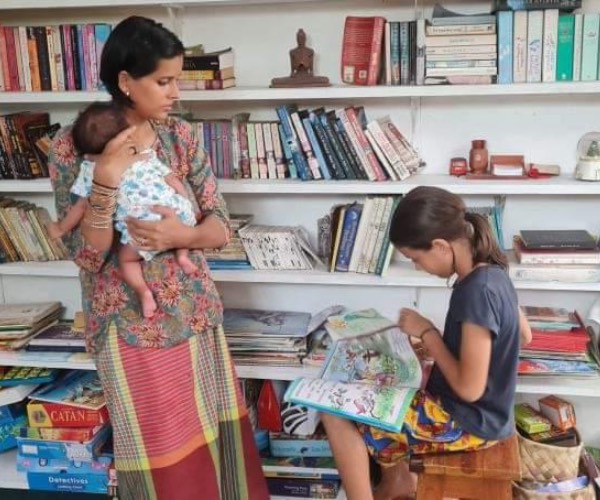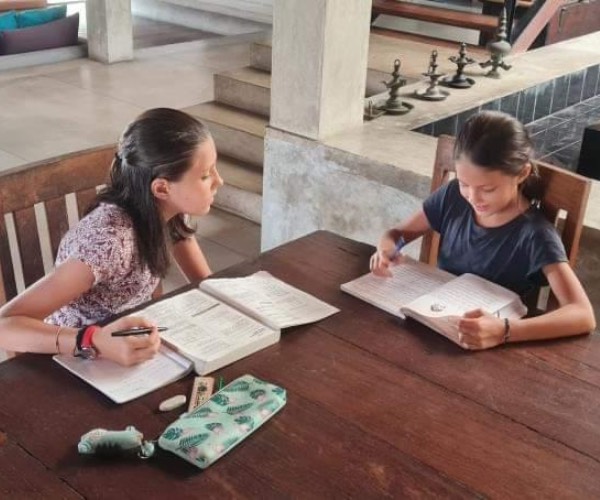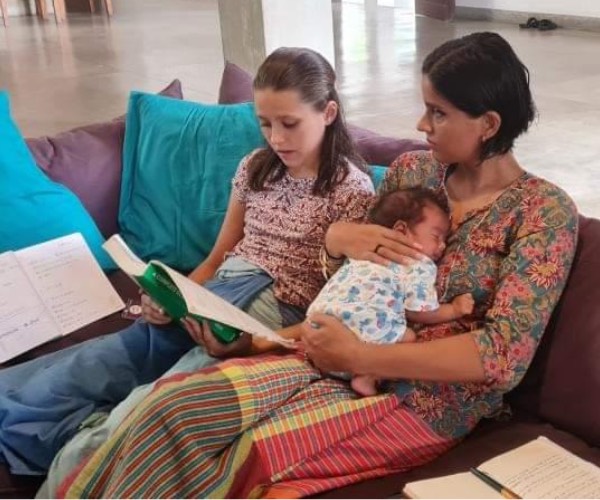
Aug 12 2022.
views 4027The pandemic and the fuel crisis in the country sent the education system into disarray; ill-equipped to handle the logistics of lesson delivery via online platforms, coupled with a lack of infrastructure, all stakeholders were scrambling to find solutions. Education was disrupted across all social strata, with children - especially the youngest - struggling to acclimatise to the new normal in learning. It didn’t take long for the topic of homeschooling to enter the discourse surrounding education, with many parents questioning if this was a viable option for their children. While homeschooling has existed pre-pandemic, it has always been regarded with some derision. But with the changing times, parents have been wondering if it’s worth a try.
Life/parenting coach, fine artist, and designer Yasodhara Pathanjali is no stranger to homeschooling. Born and brought up in London, Yasodhara was homeschooled until she was 17 years old, and now a mother herself, she has been homeschooling her two daughters. Yasodhara recently shared her thoughts on homeschooling with the Daily Mirror Life.

Q You were homeschooled. Is that what motivated you to homeschool your children instead of opting for “conventional” schooling?
I was homeschooled with my brother till I was 17. So my first proper day at school was stepping into year 12 and A Levels. The homeschooling environment that we had growing up was wildly different from how my girls are educated, but from an early age, I realised the potential in it and also just how much freedom came with it. So long before I had children, I had decided to home school them.
Also as I got older and researched more about education and its origins and why it’s globally built the way it is, it became increasingly clear that nothing about the system is geared towards children and their development. It’s all aimed at creating a workforce, a subservient and obedient society.
Q Homeschooling is a widely contested topic that people have strong, yet wide-ranging opinions about. Why do you think it has such an unfavourable reputation?
Ignorance and narrow-mindedness. Sadly just like the arguments for corporal punishment for children, homeschooling gets the same kind of approach from critics. That idea that suffering is what made them who they are, so future kids should suffer too. There’s also the fact that information dissemination has moved on hugely in the last few decades and we no longer need “teachers” to give us information. In progressive schools around the world (which are still very rare) teachers are being replaced by “facilitators”, who support a child’s learning journey. And that is a much more appropriate method of education than what we see in most schools around the world.
Apart from a lack of in-depth understanding of what education is and what it should be, there is also a huge lack of understanding about what homeschooling is. People often believe that it’s children locked away from society, lonely, lacking in social skills and turning into geeks and nerds.
The reality is that homeschooling just means that the family gets to decide on what their education journey is and this journey is extremely diverse. There are families who will follow very academic pathways, others more religious or cultural, yet others who unschool and don’t believe in any structure and others who world school, which involves travelling the world to seek out education through experience. So you can’t generalise and say that homeschooling produces “this kind” of child/adult. It’s entirely based on the family’s decisions.
Q How has your homeschooling approach changed since you began? What is working for you now?
When I started actively homeschooling, almost 12 years ago, I was more structured and more linear in how I saw success. But by allowing my elder daughter to lead the way, by allowing myself to learn from her development, I was able to understand how letting go and a more relaxed approach actually accelerated her learning.
Now I really let the girls lead their education, in terms of interests, the speed at which they can progress and also the style of education. Each child learns differently and being open to exploring, that means that they learn faster, better and retain more. While the girls are able to lead those aspects of their education, I stay focused on their basic skills, social skills and whether they are at a good standard for their age. I also keep an eye on any additional needs that they have and make sure we cater to them.
Q What is your biggest surprise about homeschooling? Is there an unexpected benefit or drawback to it?
I think as I grew up being home-schooled, I’ve not encountered any surprises. It’s been joyful seeing the girls explore the world and learn so many different things. I love that the freedom they have to choose has led us to subjects and topics that I’d never have imagined. For instance, my older one (she is 11), has started studying archaeology, which I’d never have come up with myself.

Q What would your absolutely perfect homeschooling day look like?
Some kind of day trip. Because homeschooling for me is about learning from every life experience, going somewhere as a family can teach many different skills. From maths (with money and paying for things, time with travelling) to social skills (interacting with diverse people) to history or geography (from the places we visit) to science (from weather to how things work) etc.
Those kinds of days also allow different children of different ages and need to learn at their level but all from one experience. And family bonding is something that can’t be measured.
Q “Traditional” schools have structure, trained teachers specialising in their subjects, and provide opportunities for socialisation. How do you provide the same opportunities for your children through homeschooling?
I really dispute the 'trained teachers who specialise' part. There are teachers out there who are fantastic and who know their topic and are passionate enough to keep up-to-date with both the topic and teaching methods. But you hear about so so so many who are not. They teach out-of-date information with little to no knowledge of child-friendly teaching methods, teachers who use corporal punishment, teachers who ridicule children, teachers who just read books at the children etc.
So this idea that across-the-board school provides all children with great teachers is a fantasy. Then comes the question of socialisation. Children in school mostly socialise with children born the same year as them, in very limited time slots, while following strict school rules. There is a lot of bullying too.
Outside of the school system, children are free to interact with a hugely diverse group of people, of all ages, backgrounds and circumstances. They are able to practise real-world scenarios and learn about how everything in the world really works, as opposed to sitting inside the 4 walls of a classroom.
The covid crisis and now the fuel crisis has driven many parents to believe that they are homeschooling. This is incorrect. When online schooling is present, it is purely distance learning. And I think distance learning must be difficult because you have none of the freedoms of homeschooling.
Q You are a life/parenting coach, fine artist, and designer. You’ve just had a new baby. How are you able to balance your professional life, your home life and find the time to teach your children?
I don’t “teach” the children. As a household, all 4 of us, myself, my husband and the children, all work at the same time. We start in the morning and we support each other through the day with what we are doing. So both I and my husband are always on hand to explain things to the girls. They might come and ask us something and we will spend some time explaining or working out something with them, but then they will go and work on their own, while we continue with our own work. So it's a lovely co-working experience.
The baby too fits in somehow. Our day is one where we all pull together to get our work, studies and housework done together.

Q You are a very vocal advocate for homeschooling. Do you think that it’s the right solution for all families? What about parents who haven’t had the education that you have?
No. I don’t believe that homeschooling is for everyone. It requires a lot of emotional investment, a lot of planning and a lot of constant analysis of your family’s strengths and weaknesses. It is very much a facilitator's role. So there’s a lot of searching for solutions and methods and providers.
Saying that I also don’t believe that the education system is at all fit for purpose. And I wish parents were more vocal, demanding change, demanding the best for their children. There are fantastic things happening in some schools around the world, particularly in Bali and Scandinavia, where you see schools switching away from teaching any subjects to far more effective methods like project learning. There are peer teaching models coming up, there are self-teaching models too.
The education system is very unprepared to cater to the future, considering the speed at which the digital era has changed our world, employment and life in general over the last 20 years. More than 60% of the jobs our children will take up haven’t even been invented yet, but we are still teaching them how we were taught 50 years ago. Fact, information centred with no consideration for skill and thinking development. It’s going to create many economic and social issues in the coming decades.
Photo credits: Yasodhara Pathanjali
0 Comments